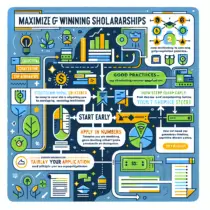Maximizing Your Chances in the Competitive World of Scholarships
In today’s competitive academic environment, securing a scholarship can be a game-changer for many students. Scholarships not only provide financial relief but also open doors to prestigious educational opportunities. The question often arises: How can one maximize their chances of winning scholarships? The answer lies in thorough research, strategic planning, and an aligned approach that recognizes and meets the selection criteria effectively.
Achieving success in acquiring scholarships begins with understanding the landscape of available opportunities. For instance, scholarships like the "$5000 Engineering Future Leaders Australia 2024" are designed to attract promising students with a keen interest in engineering. Such targeted scholarships demand a clear alignment between the applicant’s profile and the scholarship’s objectives.
One cardinal rule in the scholarship hunt is to start early. Beginning the application process well in advance provides ample time to gather necessary documents, craft compelling essays, and seek recommendation letters. Early preparation also provides the advantage of exploring diverse scholarships and understanding their distinct requirements.
The importance of organizing the application process cannot be understated. Developing a spreadsheet or a checklist can help track deadlines, submission requirements, and the different stages of each scholarship application. This proactive organization is crucial, given the different parameters that scholarships like the "$35,466 University of Kansas USA Phi Theta Kappa Scholarships 2023" might require.
Crafting a personal statement or essay is often a significant component of the scholarship application. It’s here that applicants can distinguish themselves by telling their unique story. It’s vital to tailor these narratives to the specific scholarship, demonstrating how one’s achievements, goals, and vision align with the scholarship’s aims. For example, articulating leadership experiences and aspirations in engineering would be pertinent when applying for the "$5000 Engineering Future Leaders Australia 2024."
Furthermore, gathering strong letters of recommendation can significantly bolster an application. Selecting individuals who understand the student’s capabilities and aspirations provides authenticity and depth to the application. It is advisable to approach these recommenders early, providing them sufficient time to craft thoughtful endorsements.
Another critical factor is academic performance, which remains a central criterion for most scholarships. Keeping a strong GPA not only helps in meeting eligibility requirements but also portrays a student as diligent and committed to their academic pursuits. This is particularly important for high-value scholarships like the "$35,466 University of Kansas USA Phi Theta Kappa Scholarships 2023," where academic achievement is highly prioritized.
With the advent of digital platforms, many scholarships have an online presence, making research and applications more accessible. Platforms dedicated to scholarship searches can help students discover opportunities that align with their career paths and interests. It is beneficial to frequently visit these sites and sign up for alerts on new scholarships, ensuring that no opportunity goes unnoticed.
While those are essential strategies for individual application processes, networking can be an underutilized tool in securing scholarships. Engaging with academic counselors, attending college fairs, and connecting with alumni can yield valuable insights and insider tips on scholarship applications. This exposure can reveal lesser-known scholarships and offer guidance on crafting standout applications.
Applicants can also enhance their eligibility by participating in extracurricular activities, volunteering, and gaining work experience, which strengthen their profiles beyond academic achievements. This holistic approach demonstrates well-roundedness, a quality that scholarship committees often look for in candidates.
In the quest for scholarships, it’s beneficial to adopt a global perspective. International scholarships present an exciting avenue for students willing to study abroad. Opportunities like the "$5000 Engineering Future Leaders Australia 2024" not only provide financial aid but also offer enriching cross-cultural experiences that are invaluable in today’s globalized world.
Persistence is key in the scholarship application journey. Rejections can be disheartening but should not deter continued efforts. Learning from each application cycle, seeking feedback, and refining future submissions can increase chances of success.
The guidance outlined here emphasizes strategic planning, credible storytelling through essays, timely organization, and leveraging networks to maximize scholarship opportunities. By proactively aligning individual strengths with the criteria of scholarships such as the "$35,466 University of Kansas USA Phi Theta Kappa Scholarships 2023," students can significantly enhance their chances of securing these vital educational resources.
In conclusion, maximizing one’s chances in the competitive world of scholarships involves a multifaceted approach. By starting early, staying organized, crafting personalized applications, and utilizing available resources and networks, students can navigate the scholarship landscape successfully. Scholarships like the "$5000 Engineering Future Leaders Australia 2024" and the "$35,466 University of Kansas USA Phi Theta Kappa Scholarships 2023" can only be seized with a determined attitude and strategic foresight. Thus, with the right preparation and mindset, students can unlock doors to unparalleled academic and personal growth opportunities through scholarships.






